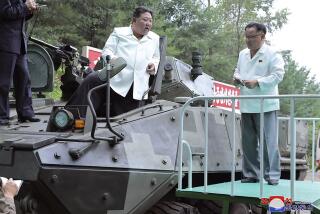President-Elect Hits ‘Buy Korean’ Drive
- Share via
SEOUL — In an effort to defuse criticism of a frugality campaign that has led to a sharp cutback in imports and heightened nationalist sentiment, President-elect Kim Dae Jung has advised his staff to avoid slogans such as “Buy Korean only.”
And in a meeting with top foreign executives Wednesday, Kim assured them that South Korea’s campaign to reduce its debts and bolster its foreign reserves would focus on restricting purchases of all luxury goods rather than targeting imports.
“We should not stop people from buying cheap and quality foreign products at all,” he told the executives attending the meeting at the Hotel Shilla. “We should only discourage excessive and expensive spending.”
Since his election last month Kim, who developed strong international ties during his years as a dissident leader, has tried to channel his nation’s patriotic sentiments in a direction that would improve South Korea’s financial picture without alienating foreigners.
But it hasn’t been easy. Saddled with more than $150 billion in foreign debt, South Korean officials have urged their citizens to reduce unnecessary purchases, and a grass-roots anti-import movement has gained steam.
Sales of imported goods ranging from cigarettes and automobiles to industrial products have dropped sharply since December, when citizens’ groups began anti-import campaigns designed to save their nation’s precious hard currency.
In part, that is due to the collapse of South Korea’s currency, the won, which has made imported products more expensive. But foreign executives fear that the “buy Korea” campaign and what they see as a rising anti-foreign sentiment have pushed things too far. With layoffs mounting and the economy deteriorating, they fear these sentiments could spin out of control.
That and the prospect of soaring low-cost Asian exports to the United States come amid growing criticism in Congress over U.S. financial support to South Korea and other faltering Asian countries through more than $100 billion in international bailout funds made available to the region.
In a televised town hall meeting on Sunday, he urged South Koreans not to turn their resentment against foreigners or foreign goods and said the country’s recovery depends on opening its borders to overseas investment.
He made a personal phone call to the chief executive officer of Dow Corning Corp. and offered inexpensive land and other incentives if the company would invest in South Korea, according to the Korea Herald. Dow is considering a $2-billion silicon production plant in North Cholla Province.
South Korean officials are also working on other programs to improve the foreign investment climate, such as additional tax breaks and attractive land leasing opportunities, according to H.R. Park, a spokesman for the president-elect’s transition team.
More to Read
Sign up for Essential California
The most important California stories and recommendations in your inbox every morning.
You may occasionally receive promotional content from the Los Angeles Times.













